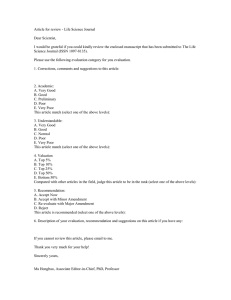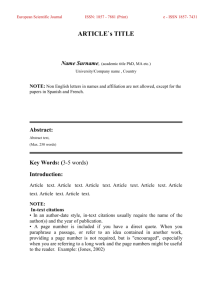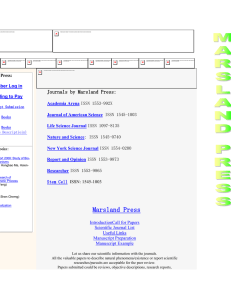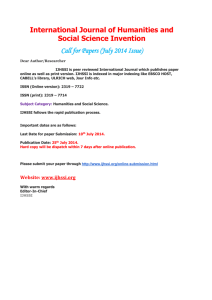studies on availability and utilisation of mining equipment
advertisement
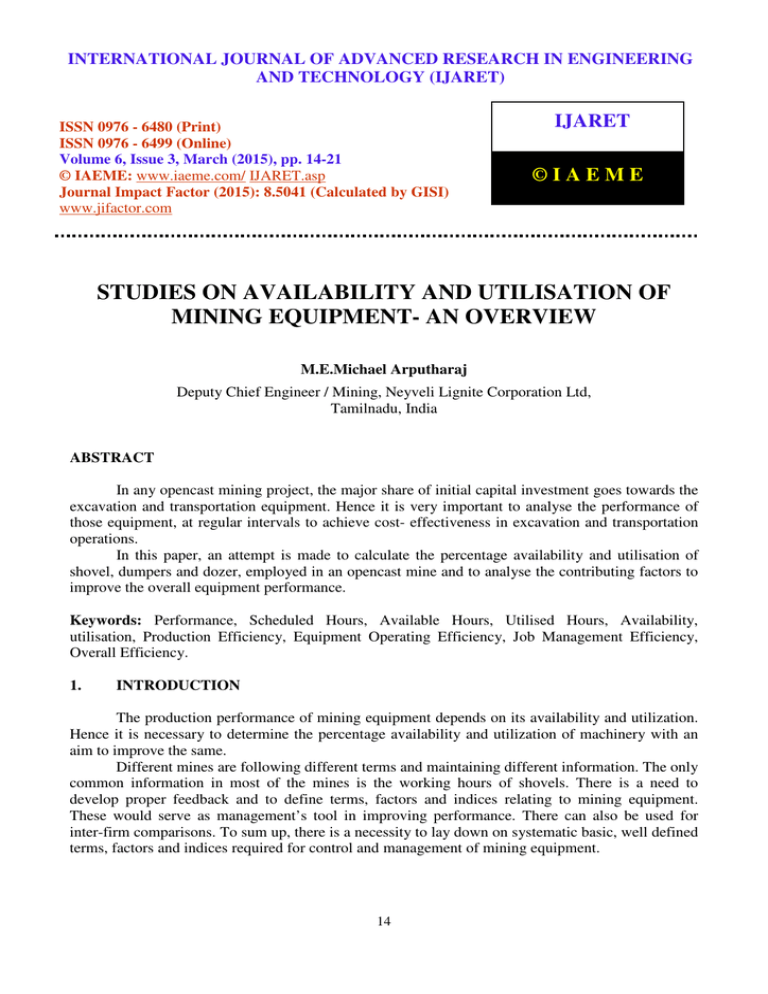
INTERNATIONAL OF ADVANCED ENGINEERING International Journal of JOURNAL Advanced Research in Engineering RESEARCH and TechnologyIN (IJARET), ISSN 0976 – AND TECHNOLOGY (IJARET) 6480(Print), ISSN 0976 – 6499(Online), Volume 6, Issue 3, March (2015), pp. 14-21 © IAEME ISSN 0976 - 6480 (Print) ISSN 0976 - 6499 (Online) Volume 6, Issue 3, March (2015), pp. 14-21 © IAEME: www.iaeme.com/ IJARET.asp Journal Impact Factor (2015): 8.5041 (Calculated by GISI) www.jifactor.com IJARET ©IAEME STUDIES ON AVAILABILITY AND UTILISATION OF MINING EQUIPMENT- AN OVERVIEW M.E.Michael Arputharaj Deputy Chief Engineer / Mining, Neyveli Lignite Corporation Ltd, Tamilnadu, India ABSTRACT In any opencast mining project, the major share of initial capital investment goes towards the excavation and transportation equipment. Hence it is very important to analyse the performance of those equipment, at regular intervals to achieve cost- effectiveness in excavation and transportation operations. In this paper, an attempt is made to calculate the percentage availability and utilisation of shovel, dumpers and dozer, employed in an opencast mine and to analyse the contributing factors to improve the overall equipment performance. Keywords: Performance, Scheduled Hours, Available Hours, Utilised Hours, Availability, utilisation, Production Efficiency, Equipment Operating Efficiency, Job Management Efficiency, Overall Efficiency. 1. INTRODUCTION The production performance of mining equipment depends on its availability and utilization. Hence it is necessary to determine the percentage availability and utilization of machinery with an aim to improve the same. Different mines are following different terms and maintaining different information. The only common information in most of the mines is the working hours of shovels. There is a need to develop proper feedback and to define terms, factors and indices relating to mining equipment. These would serve as management’s tool in improving performance. There can also be used for inter-firm comparisons. To sum up, there is a necessity to lay down on systematic basic, well defined terms, factors and indices required for control and management of mining equipment. 14 International Journal of Advanced Research in Engineering and Technology (IJARET), ISSN 0976 – 6480(Print), ISSN 0976 – 6499(Online), Volume 6, Issue 3, March (2015), pp. 14-21 © IAEME 2. RECORDS TO BE MAINTAINED For a proper analysis of the performance of equipment one must keep proper and up- to-date records regarding the following. 2.1. Calendar Hours (CH) This means the total number of hours during the period of observation. It is equal to 365*24=8760 hours in a year. 2.2. Scheduled Shift Hours (SSH) This means number of hours, the mine employing the machinery is supposed to work in a year. This is a management decision after giving due consideration to the type of mineral mined, the ore reserves, the output of mineral, capital investment involved, market conditions, labour conditions etc. The higher the capital investment, the higher should be the figure for scheduled- shift – hours. In advanced countries very large equipment work round the clock. In India, the general tendency is to work for 16 hours a day and six days a week. In the mine under consideration, the equipment are planned to work for two shifts of six hours each. So the scheduled shift hours are 12 hours per day. 2.3. Machine Available Hours (MAH) This means the number of hours, out of schedule shift hours; a machine is available for work at a face. The maintenance programme dictates it. Technical department’s expertise and availability of spares have bearings on this. This also indicates how earnest and agile the management is to get maintenance and spare supply departments. 2.4. Actual Hours Machine Worked in a Year This information is very important as it reflects the efficiency of coordination of various operations of production departments. Lack of coordination may result in machine being idle for want of blasted ore or matching equipment etc. Difference between machine available hours and actual hours of use measures the lapse of operating department. 3. FACTORS AND INDICES From the basic information collected, as above availability and utilization factors both on schedule-shit-hours basis and on machine-available –hours basis, production efficiency and overall efficiency can be determined. In the following paragraphs these factors and indices have been defined and their importance brought out. 3.1. Percentage Availability A machine is considered available when it is fit to be put to perform its duties. The availability is determined by dividing the hours the machine is available and is used plus the hours it is available but not used due to various reasons over a period of one year. It is normally expressed in percentages. Number of scheduled-shift-hours in a year for equipment operation is taken as total shift hours. Overtime hours of work if any are added to the total shift hours. Stoppage of less than 15 minutes is ignored and the machine is taken as having been used during that period. Percentage availability helps in judging and comparing the efficiency of the maintenance departments of different units. This can also assist the management in knowing how the availability of machine would change by changing the scheduled shift hours of work. Percentage availability of machine would change by changing the scheduled shift hours of work. 15 International Journal of Advanced Research in Engineering and Technology (IJARET), ISSN 0976 – 6480(Print), ISSN 0976 – 6499(Online), Volume 6, Issue 3, March (2015), pp. 14-21 © IAEME 3.2. Utilization Factor (UF) This is defined as the ratio of the time in hours the machine is actually used in ayear to the total hours. Here the denominator, i.e. total hours can be either total annual Scheduled – Shift – Hours (SSH)or total Machine Available Hours (MAH) in a year and depending upon that the value of UF will change. As MAH is always less than SSH, UF, based on MAH will be higher that UF based on SSH Actual Hours of use in a year UF SSH =----------------------------------------------------------------------------------------SSH Actual Hours of use in a year UF MAH =----------------------------------------------------------------------------------------MAH UF SSHis a measure of the efficiency of both maintenance and operational staff, whereas value of UF MAHindicated the enthusiasm and effectiveness of operational staff alone. 3.3. Production Efficiency (Pe) Actual Output Production efficiency (Pe)--------------------------------------------*100 Theoretical output Figure of output may be for an hour or shift or a year. As a matter of fact it is the product of equipment operating efficiency and the job management efficiency. Here it is necessary to mention something about equipment operating efficiency and the job management efficiency. Equipment operating efficiency is determined by the capacity at which it is operating as compared to its rated capacity. Influencing factors are within the equipment-sluggish behaviour of hydraulic systems, etc. Job management efficiency is influenced by external and environment factors,- weather , human skill, etc. their values are only empirical ones. Table 1,2 and 3 give values of them applicable in most of mining conditions. Table 1- Equipment Operating Efficiency Equipment Operating Efficiency Remark 0.90 Good 0.80 Average 0.70 Poor Table 2- Job Management Efficiency Job Management Efficiency Remark 1.00 Good 0.85 Average 0.65 Poor 16 International Journal of Advanced Research in Engineering and Technology (IJARET), (IJARET) ISSN 0976 – 6480(Print), ISSN 0976 – 6499(Online), Volume 6, Issue 3, March (2015), pp. 14-21 © IAEME Table 3 - Combined Efficiency Factors (Production Production Efficiency) Efficiency Equipment operating efficiency Good Average Poor Job management efficiency Good 0.90 0.80 0.70 Average 0.77 0.68 0.60 Poor 0.59 0.52 0.45 When the shovel is operating as an independent unit such as in stripping operations where the material is cast and not loaded into trucks, the production efficiency is equal to equipment operating efficiency. But when the shovel is part of a system both equipment equipment operating efficiency and job management efficiency are obviously to be considered. 3.4. Overall Efficiency (Oe) It is the product of Utilization Factor on the basis of Scheduled-Shift Scheduled Shift –hours and production Efficiency Or Oe = Pe*UF SSH It is an overall erall performance measure and is the one in which the top management is actually interested. A Manipulation in Utilization factor by recording more operation time or in production efficiency by recording less time cannot alter or inflate the figure in overall overall Efficiency. Efficiency 4. ANALYSIS OF AVAILABILITY AND UTILIZATION OF EQUIPMENT DURING A YEAR The month wise details regarding working hours, repair hours, idle hours, availability and utilization of various equipment including shovel, dumpers and dozer have been collected and analysed.. The month wise percentage availability and utilization on MAH and SSH basis for shovel, dumper and dozer havee been shown graphically in Fig1, Fig 2, and Fig 3 respectively. 17 International Journal of Advanced Research in Engineering and Technology (IJARET), ISSN 0976 – 6480(Print), ISSN 0976 – 6499(Online), Volume 6, Issue 3, March (2015), pp. 14-21 © IAEME Those values for the whole year have been given in table4 18 International Journal of Advanced Research in Engineering and Technology (IJARET), ISSN 0976 – 6480(Print), ISSN 0976 – 6499(Online), Volume 6, Issue 3, March (2015), pp. 14-21 © IAEME Tabel 4. Availability and utilization of equipment for a year Equipment Shovel Parameter L6 H31 H32 H33 H34 H37 D4 Spoil removal (in hours) 1756.10. 962.10 374.40 1144.70 1371.25 1569.05 - Others (in hours) 244.40 92.25 39.40 111.70 134.10 144.80 1676.76 Working hours 2000.50 1054.35 413.80 1454.40 1505.35 1710.85 1676.67 Idle hours 845.80 1963.45 643.40 1683.35 1731.50 1518.70 934.09 Repair hours 608.45 424.70 2406.0 154.60 261.10 186.65 837.85 Total scheduled hours 3456.0 3442.50 3463.20 3292.35 3497.95 3416.40 3448.70 Availability (%) Utilization on MAH basis (%) Utilization on SSH basis(%) 82.64 87.39 30.53 95.42 93.78 94.42 76.60 70.36 35.03 39.14 44.44 46.53 53.20 63.47 58.15 30.61 11.95 42.20 43.64 50.23 48.62 Dumpers Dozer The average values of percentage availability and utilization of shovel, dumper and dozer are given in table5.The CIL Standards (C.M.P.D.I norms for Coal India Limited ) for those values have been given within brackets for comparison purposes. Table 5.Comparison of percentage availability and utilization with C.I.L standards Equipment Availibality Utilization on SSH Basis Shovel 82.64(80) 58.15(58) Dumper 80.31(67) 35.73(50) Dozer 76.60 (70) 48.62(45) Values with brackets indicate C.I.L.norms Table 6 gives the percentage of unscheduled hours, unavilable hours, unutilized hours and utilized hours with regard to calendar hours. Table 6. Percentage Distributions Of Calendar Hours Parameters Shovel Dumper 60.56 60.93 Unscheduled hours 6.940 7.84 Unavailable hours 9.76 17.22 Unutilized hours 22.84 14.01 Utilized hours 100.00 100.00 Calendar hours Dozer 60.64 9.56 10.66 19.14 100.00 The percentage distributions of calendar hoursin case of shovel, dumper and dozer have been shown in fig 4, fig 5 and fig 6 respectively. 19 International Journal of Advanced Research in Engineering and Technology (IJARET), ISSN 0976 – 6480(Print), ISSN 0976 – 6499(Online), Volume 6, Issue 3, March (2015), pp. 14-21 © IAEME Fig 4. Percentage Distribution of Calendar Hours of Shovel Unscheduled Hours 23% 10% Unavailable Hours Unutilized Hours 60% Utilized Hours 7% Fig 5. Percentage Distribution of Calendar Hours of Dumper 14% Unscheduled Hours Unavailable Hours 17% Unutilized Hours 61% Utilized Hours 8% Fig 6. Percentage Distribution of Calendar Hours of Dozer Unscheduled Hours 19% Unavailable Hours 11% Unutilized Hours 60% Utilized Hours 10% 5. FINDINGS OF THE ANALYSIS The results of the analysis show that the unscheduled hours are vey high since the equipment are scheduled only for two shifts, that too only for six hours in a shift. The availability of the equipment is comparable with that of CIL standards, but there is a wide gap between availability and utilization of equipemnt . The percentage utilization of machinery especially that of dumper is belor normal. Hence the managemetn has to take steps to improve the equipment utilization. 20 International Journal of Advanced Research in Engineering and Technology (IJARET), ISSN 0976 – 6480(Print), ISSN 0976 – 6499(Online), Volume 6, Issue 3, March (2015), pp. 14-21 © IAEME 6.CONCLUSION Availability and utilisation study is a known method to measure performance of productionequipment in manufacturing industries and adapted for mining industry in this paper. The views expressed in this paper are of the author and not necessarily of the organisation, he belongs to. REFERENCES 1. 2. 3. 4. 5. Sharma S.N., and Surana D.M., 1972, Analysis for Performance Assessment and Performance Control of Dipper Shovels used in Mines, Journal of Mines, Metals & Fuels, August,1972. Singh B.P., 1997, Mine Mechanisation and Safety – A case Study on Ananta OCP of Mahanadi Coalfields Ltd., Journal of Mines, Metals, & Fuels, January,1997. Singh B.P. and Tiwari , 1984, Application of Reliability and Availability to Underground Mine Transport, Journal of Mines, Metals, & Fuels, January,1984. Dr. Anshu bhardwaj, “Financial Leverage and Firm’s Value: A Study of Metal, Metal Products And Mining Sector Firms” International Journal of Management (IJM), Volume 5, Issue 6, 2013, pp. 50 - 56, ISSN Print: 0976-6502, ISSN Online: 0976-6510. G. Sreenivasa Rao, Dr. A. Manjunath and Dr. Mvss Giridhar, “Studies on Impact of Mining On Surface and Groundwater” International Journal of Civil Engineering & Technology (IJCIET), Volume 5, Issue 6, 2014, pp. 125 - 130, ISSN Print: 0976 – 6308, ISSN Online: 0976 – 6316. 21
